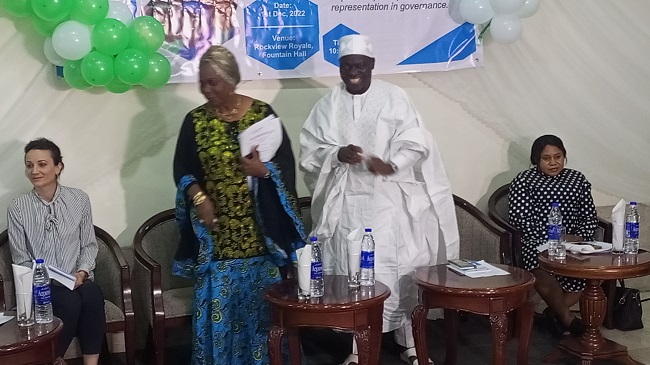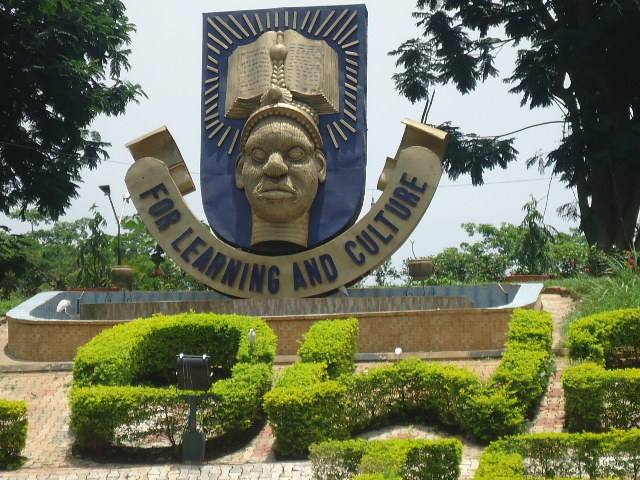[ad_1]
United Nations Country Representative in Nigeria, Fulvia Clerici, Director General of the National Institute for Legislative and Democratic Studies (NILDS), Professor Olanrewaju Suleiman and other stakeholders on Thursday tasked the leadership and members of the 9th Assembly on the need to ensure timely passage of the Gender and Equatable Opportunities Bill, 2022 currently before the Senate.
The stakeholders gave the charge in Abuja, during one-day Agenda for Policy Dialogue on the theme: ‘The Gender and Equitable Opportunity Bill: Challenges, Prospects and Way Forward, held at the instance of the National Institute for Legislative and Democratic Studies (NILDS).
In her remarks, the Sponsor of the bill, Senator Abiodun Olujimi who underscored the need for the domestication of extant Protocols and Agreements that Nigeria signed including 35 per cent Affirmative Action and other gender-related Agreements and Protocols, lamented that five similar bills initiated during previous Assemblies were stalled.
Senator Olujimi observed that Nigerian women who constitute 51.2 per cent of the country’s population “cannot be shut out and we are sitting believing it is well. It cannot be well except that portion of the society is taken care of.
“This bill had suffered greatly in the national, it suffered three assemblies; it is struggling in this fourth. And the reason is simple. It is only because it is based on gender. If it was a general thing, it wouldn’t have been so difficult.
“In the 7th Assembly, I saw there was no law that governed the issues of women generally and I felt it was not good enough for a country like Nigeria to be a signatory to protocols and agreements and not be able to domesticate them in so many years. We met a brick wall and the brick wall was not because of the men, it was based on the nuances of the women.
“In the last Senate, we gathered all the wives of Senators and asked them to go see their husbands and talk to them about the bill and say we intend to pass the bill because there were more men in the Senate than women, even now there are more men than women.
“The women came back and said we cannot stand for this because my religious conviction says this has been taken care of. We tried to convince them, but most of them were not convinced. It wasn’t about the men, it was about the women. Issues of the men came later and it had to do with the men, nobody wanted equality because of religion they did not want equality.
“So we ran into murky waters. When I came back we decide to put it up because women’s issues are societal issues. In the end, we got a document renamed, Gender and Equitable Opportunities bill, 2022 which we read for the first time.
“We have removed the seeming contentious issues. The time has come for men to take it up the bill as their own, to have buy-in and say these women are ours and because they are ours, their issues must be taken care of by us. To ensure this bill scales through. The issue is that people don’t want to pass bills on gender during elections because it could affect the outcome of their election.
“The election is very close and that is why I believe if we can tidy up as soon as possible, we can take a Second Reading as soon as possible and leave the Third Reading until after the election has taken place in March.
“Between March and May we have that window and then we can lobby and get it passed. I believe the time to pass the gender bill is now. It has lingered too long. We are allies. And so the time has come for us to see that this bill is passed and sees the light of day,” she noted.
In her remarks, NILDS Director General, Professor Olanrewaju Suleiman said that the conversations on the bill were very positive.
Professor Suleiman who was represented by NILDS’ Director on Democracy and Governance, Dr. Adewale Aderemi, however, argued that “those that were opposed to the bill are now reading the bill differently.”
On his part, the National Chief Imam, Fuad Adeyemi, National Chief Imam, Al-habibiyyah Islamic Society, while opposing the bill, said that when making laws it was important to understand the essence of the law.
“Our religion has the divine law that is unchangeable; no human being can change it and there is also the peculiar law made by people.
“Islam is not a mandate religion that one man will come and amend a law, that will not stand,” he said.
He however affirmed that the current bill has addressed major concerns bothering on inheritance for women.
While venting his view, a representative of the Federal Ministry of Women Affairs, Mr Nasiru Baba-Saleh, posited that everyone should be given equal opportunity regardless of gender to aspire politically.
In her presentation, the Programme Manager, of Women’s Rights Advancement Protection Alternative (WRAPA), Mrs. Yemisi Nathaniel, urged members of the 9th Assembly to “listen to our points on the bill” with a view to fast-tracking the passage of the bill.
ALSO READ FROM NIGERIAN TRIBUNE
UN, Stakeholders seek timely passage of Gender, Equitable opportunity bill
[ad_2]







